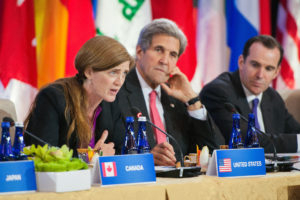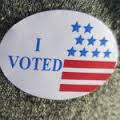About 20 miles southeast of South Bend, Indiana, straddling US highway 6, lies the farming village of Nappanee, population 6,692. The town has the distinction of being the only municipality in the United States with a name in which each letter is repeated once. Nappanee is also known as the “southern gateway to Indiana Amish country.” A few miles north of the …
Deirdre Fulton – To Reclaim Democracy, New Lawsuit Aims to Be ‘Death of the Super PAC’
While most people point to Citizens United as the case that opened the door to big money in U.S. elections, the lesser-known 2010 appeals court ruling in SpeechNow.org v. FEC is perhaps just as blameworthy—one legal scholar says the decision “gave birth to the super PAC takeover of American politics.” Now, a bipartisan group of lawmakers, congressional candidates, and campaign …
James W Carden – Magical Thinking in US Foreign Policy
Despite America’s myriad problems domestically and internationally, its geo-strategic position remains the envy of the world. Protected in the east by the Atlantic, in the west by the Pacific, to the north by Canada and to the south by Mexico, the United States is, for all intents and purposes, impervious to a foreign invasion. Its advanced and mobile nuclear arsenal …
WHY EXPERTS SAY IT’S TIME TO DITCH THE U.S. ELECTORAL COLLEGE
The US Electoral College distorts campaigns, disenfranchises voters, and drives partisanship, say scholars who argue the popular vote is far better for choosing presidents. Otherwise, “The great majority of American voters exercise no real political voice in the outcome of presidential elections,” says Doug McAdam, professor of sociology at Stanford University. Under the United States Constitution, the Electoral College determines …
American Religion Not as Exceptional As We Think
DURHAM, NC – For generations, the United States has been considered a religious outlier — its citizens more dedicated to their faith and houses of worship than the rest of the developed world. But new research from Duke University and University College London (UCL) suggests that American devotion to religion is waning, a decline mirrored across the Western world. The study …
Paul Craig Roberts – Are Americans Too Insouciant To Survive?
When one looks at the deplorable state of the world, one cannot help but wonder at the insouciance of the American people. Where are they? Do they exist or are they a myth? Have they been put to sleep by an evil demon? Are they so lost in The Matrix that they cannot get out? Ever since Clinton’s second term …
Infectious Myth – War Peace and Lesser Concerns – 12.08.15
In Episode 82 David discusses the causes of violence around the world, particularly gun violence in the United States. He also addresses political correctness, in the form of campus protests, good and bad, and also the notion of “Cultural Appropriation”. And speaking of politically correct, he addresses science that is politically correct, but perhaps not scientifically correct.
Alternative Visions – TPP Part 2: The New Corporate Government & Other Chapters – 11.20.15
Dr. Jack Rasmus looks in depth at Chapters 27-28 of the TPP and how they set up a new global corporate government. Why the TPP violates Article III of the US Constitution and how its signing on October 4 in Atlanta represents the ‘founding convention’ of a new form of global corporate government. Jack explains the new ‘legislative-executive’ body of the TPP ‘Commission’ and the new tribunal courts system and the danger they represent to existing representative government in the US and the 12 member countries. Jack critiques the claim of TPP supporters that it is a ‘living agreement’, asking if this means every time the TPP is changed as new countries join will the TPP have to be ‘ratified’ each time? If not, then corporations and bureaucrats running the Commission and Courts will change the TPP as they like. Other chapters are reviewed on trade in goods, investment, intellectual property, financial services, labor and environment. Jack challenges Obama’s claim that 18,000 tariff cuts will mean more exports and jobs for US workers, noting TPP provides no control over currency devaluations which will more than offset tariff reductions. TPP is about ensuring money and investment flows by US banks, IT, and services companies without limit. It protects big Pharma companies and removes opposition to US produced GMO products by big US Agribusiness. TPP means: more profit and sales for them and fewer jobs, lower wages, and destruction of representative Democracy for the rest.
Jack announces a new format for future shows: The first half of the show will identify critical global and US economic developments of the preceding week, followed by comments on the economic proposals and programs of US presidential candidates. The second half of the show will focus on interviews or presentations on a major feature of the US or global economy. Next week’s feature: ‘Why the Global Economy is Slowing and why the IMF, World Bank, and Central Banks Keep Under-Forecasting the Trend’.
Leid Stories – 11.17.15
Backlash: Terrorist Attacks in Paris Unleash Islamophobia in U.S.
Tariq Ali: A Prescient Lecture on What We Can Learn from Terrorists
It didn’t take long. Just four days after the terrorist attacks in Paris, and anti-Muslim sentiment has taken hold in the United States, with high-profile politicians leading the backlash.
Activist, polemicist and author Tariq Ali offers a prescient overview of terrorism and what we can learn from it.
Leid Stories – 10.01.15
The Constitution and Citizenship: The Dred Scott Decision (Conclusion)
We conclude today the discussion on the Dred Scott decision of 1857 – a case often cited as producing the worst ruling in the history of the U.S. Supreme Court.
Legal scholar Paul Finkelman, who teaches constitutional law, legal history, and race and the law at Albany Law School in New York, gave us, in two consecutive weeks, a detailed background of the case and the constitutional questions it raised.
Dred Scott, enslaved at birth – around 1799, in Southampton County, Virginia – sued for his freedom and the freedom of his wife and two daughters, on the grounds that they had lived in Illinois and the Wisconsin Territory, where slavery had been outlawed. But the Supreme Court, in a 7-2 ruling, said that no person of African ancestry ever was meant to be a citizen of the United States, nor to benefit from any rights guaranteed by the U.S. Constitution.
Today we hear from Justice Stephen Breyer, an associate justice on the U.S. Supreme Court, on the matter.










